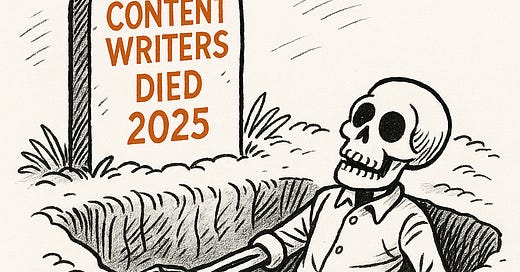10X Writer #42
Welcome to 10X Writer, the weekly newsletter designed to help writers, copywriters, and freelancers achieve 10X results with expert insights and actionable strategies.
Most content writers won’t survive the next few years.
Not because they’re lazy or untalented.
But because the rules have changed, and they’re still playing the old game.
AI is writing faster than they can.
Clients want clarity, not just content.
Every platform is louder, messier, and more crowded than ever.
They’ll keep writing. But the work will quietly dry up.
Not overnight. Gradually.
Until one day, they’ll realize they’re doing more and earning less.
If that sounds harsh, it’s only because no one else is saying it out loud.
I’ve seen brilliant writers walk away.
Not because they weren’t good.
But because no one told them what it really takes to stay relevant.
This post is that conversation.
We’ll talk about what’s changed.
What kind of writing still works.
What clients still value.
And what separates the ones who grow from the ones who quietly fade.
And we’ll begin with the question that unlocks everything:
Even if you improve, is there still a place for you?
Let’s begin.
The Ground Has Shifted, And Most Writers Didn’t Notice
For years, the advice was simple:
Write daily. Pick a niche. Show up online. Clients will come.
And for a while, it worked.
You didn’t need much to stand out. A few samples. A simple website. Some consistency.
But those times are gone.
You’re not competing with a handful of writers anymore.
You’re in a sea of sameness. Everyone’s writing in similar tones, using the same formulas, chasing the same formats.
Some aren’t even writers. They’re AI tools trained to mimic what already exists.
You’ve probably felt it.
The silence after a pitch.
The drop in engagement.
The creeping thought: Is it just me?
It’s not just you.
Clients aren’t looking for more content. They’re looking for clarity. They want direction. They expect results.
They’re asking:
Will this move my audience to act?
Does this writer understand my goals?
Can they make this feel important, rather than just another task?
They don’t want more words. They want thinking.
Most writers haven’t caught on. They’re still measuring success by volume. Still writing as if hitting the brief is the finish line.
But the writers who thrive now think differently.
They don’t just write. They align.
They study the business. The platform. The reader.
And then they write with precision.
That’s the shift.
If you ignore it, the work won’t just slow down. It will vanish.
Not because you’re not good.
Because the game moved, and you didn’t.
AI Didn’t Kill Writing. It Killed the Average Writer
The fear is everywhere.
You see AI-written carousels. You read decent blog posts, then realize they’re machine-generated.
You pitch a client, and they tell you they’ve automated content for now.
It’s happening. But not the way most people think.
AI isn’t killing writers.
It’s killing writing that never should have survived in the first place.
The bloated intros. The recycled how-to guides. The 500-word explanations for something that needed 50.
That kind of writing was already under pressure.
AI just sped up the collapse.
The clients who used to settle for “good enough” don’t need you anymore.
They have tools. Templates. Entire content systems.
If your writing sounds like the output of those tools, you’re replaceable.
Not because you’re not trying. But because the result is indistinguishable.
Here’s the real issue:
If a machine can do 80% of your job, your problem isn’t the machine.
It’s the 20% you’re still holding onto.
Because that’s where writing is headed.
It’s moving toward the parts AI can’t replicate.
Clear judgment.
Emotional nuance.
Storytelling in context.
Voice that feels unmistakably human.
The ability to know what not to say.
Those aren’t copy tricks. That’s clarity. That’s taste.
AI doesn’t have that.
So the question isn’t whether AI will replace you.
It’s whether you sound like someone worth keeping.
If yes, you’ll grow.
If not, you will be replaced.
The Only Writers Clients Are Still Looking For
Decent writing is everywhere now.
That’s the problem.
With enough time and tools, most people can string together something that sounds decent.
But clients aren’t hiring for decent.
They’re hiring for movement.
They want writing that creates momentum, sparks action, and drives outcomes.
The ones they keep coming back to usually fall into three types.
The Strategic Content Writer
This writer sees beyond the piece.
They ask, “What’s the goal of this?” before they ask what needs to be written.
They map content to the buyer’s journey.
They know how to earn trust without pushing too hard.
They think like a strategist, and that’s what clients pay for.
The Ghostwriter for Experts
These writers help others sound like the best version of themselves.
They work with founders, coaches, CEOs — people who have thoughts, but no time or clarity.
They don’t just capture voice. They extract insight.
They turn raw, messy notes into well-structured arguments.
They help clients articulate what they already know, but couldn’t say well.
Their value isn’t in writing. It’s in making someone else’s thinking land.
The Editorial Partner
They’ve moved beyond writing.
They shape the entire content ecosystem.
They give feedback. Guide direction. Decide what gets published and what doesn’t.
They’re not on Twitter chasing likes.
They’re behind the scenes, trusted by people who matter.
They’re not hired for their words. They’re hired for their judgment.
These writers don’t chase work.
They don’t explain their value.
They just keep getting referred.
That’s what happens when you stop writing just to finish something and start writing to move something forward.
The Skills That Separate Writers Who Grow From Writers Who Fade
Writing more doesn’t mean getting better.
The writers who grow do it by sharpening skills most people ignore.
Audience Insight
You already know the basics.
But so does everyone else.
The next level isn’t asking, “What does my audience want?”
It’s asking:
What are they tired of hearing?
What do they nod at, but never act on?
What’s a deeper frustration they haven’t named yet?
Real insight breaks the pattern.
It spots what others scroll past.
That’s what makes it stand out.
Structure
Structure isn’t just subheads and spacing.
It’s the path your reader walks.
It’s the order in which they must hear things to believe them.
It’s how you move someone from “I’m not sure” to “this makes sense.”
Most writers write in the order they think.
The best ones rearrange it in a way that someone needs to feel.
Synthesis
You’re already researching. Great.
But most stop there.
They summarize what others said and hit publish.
The result? Familiar, safe, forgettable.
Synthesis is different.
It connects the dots in a way that makes people say, “I’ve never heard it put like that before.”
You can learn this.
You start by asking: What’s everyone else circling around but not landing?
Then you write that piece.
Voice
Voice isn’t style. It’s thought.
It’s how someone frames an idea, where they pause, and what they emphasize.
If you’re ghostwriting, your voice doesn’t matter. Theirs does.
Can you make someone sound like themselves, at their clearest?
If yes, you’ll always have work.
Platform Awareness
Repurposing isn’t enough.
Platform awareness means understanding how someone consumes content.
Are they focused or distracted? Searching or scrolling?
The same sentence that lands on Twitter can flop in an email.
The same story that hooks on LinkedIn can feel slow on Instagram.
You’re not just writing for platforms.
You’re writing for mental states.
5. Client Work Is Not the Only Path
Most writers begin with a single plan:
Learn the skill → Get a few clients → Raise your rates → Repeat
And for a while, it works.
You get paid. You grow. You build a reputation.
But eventually, the cracks show.
Clients are unpredictable.
One month, you're full. Next, you're chasing invoices and rewriting a bloated deck at midnight.
And beneath it all is the quiet question:
“Is this it? Just client after client until I burn out?”
It doesn’t have to be.
The writers who build real careers — the ones who create freedom and leverage — treat writing as an asset, not just a service.
Here’s how they do it:
Writing as Authority
They use content to build visibility.
They don’t just write to get clients. They write to build a name.
Their posts, essays, or newsletters reflect how they think, not just what they do.
That clarity becomes a moat.
Writing as Leverage
They stop trading time for money.
They create assets: templates, guides, short courses, and tools.
Even a small guide can out-earn a week of client work if it solves a sharp problem.
They scale once. They sell many times.
Writing as Opportunity
They ghostwrite for the right founder and get invited to strategy calls.
They help a coach grow and get offered a rev-share.
They don’t just write. They get in the room.
Writing opens the door.
Thinking keeps them inside.
You don’t have to stop doing client work.
But you no longer need to write for clients as your only way forward.
You start asking:
What do I want to be known for?
What will I still be proud of in five years?
How can I build a body of work, not just a series of tasks?
That’s when things start to shift.
Can I Even Last in This Field Anymore?
You’re not new.
You’ve put in the hours. You’ve worked with clients. You’ve shipped good work.
But something feels off.
The platforms don’t work like they used to.
Clients are pickier. Tools are evolving.
You’re doing more but feel like you're stuck in place.
You ask yourself:
“Am I even built for this anymore?”
Here’s the truth:
Most writers won’t last.
Not because they don’t have talent, but because they resist change.
They hope the old ways will start working again.
They avoid learning how to pitch or position themselves.
They wait for briefs instead of solving problems.
The ones who thrive?
They evolve. On purpose.
They get sharper at understanding what’s changing, and they realign.
With what the market values.
With their own strengths.
With where they want to go next, not where they started.
They stop treating writing as a fixed skill.
They start treating it as a system that adapts with time.
They try new formats. Test new offers.
They become more useful in more ways.
That’s the difference.
Writers who survive don’t just write harder.
They shift when the world shifts.
If you’re willing to do that, there’s still room for you.
But if you’re waiting for things to go back to “normal,” you’ll be left behind.
This field still rewards insight. It still rewards clarity. It still rewards resilience.
But not passively.
You don’t survive by writing more.
You survive by becoming too valuable to ignore.
Mistakes That Kill Your Chances Without You Realising It
Most writers don’t quit because they fail.
They quit because they stall.
The stall starts small. Quiet.
A few habits. A few decisions. A few blind spots.
Let’s call them out.
Mistake 1: Writing Without Positioning
If your writing doesn’t stand for something, it fades into the noise.
You’re not just sharing content. You’re shaping how people see you.
Good positioning answers:
Who is this for?
What perspective do I bring?
What do I consistently write about, and what do I ignore?
Without that, you’re forgettable.
Mistake 2: Measuring Progress by Output Alone
More words don’t mean better work.
If your old posts look just like your new ones, you’re not growing.
You’re looping.
Real improvement shows up in sharper ideas, cleaner structure, and bolder thinking.
If your older work doesn’t make you cringe a little, you haven’t leveled up.
Mistake 3: Skipping Feedback Loops
Most writers write in isolation.
They avoid critique. They publish and move on.
But growth without feedback is fiction.
Great writers invite friction.
They revisit old drafts.
They analyze what worked and why.
They learn from results, not just effort.
Every skipped feedback loop is six months of growth lost.
Mistake 4: Selling Skills Instead of Solving Problems
Clients don’t buy words.
They buy what those words do.
When you sell blog posts, you compete with everyone.
When you sell results, trust, leads, clarity, and conversions, you stand out.
Mistake 5: Doing Everything Alone
Isolation feels normal in this field. But it’s dangerous.
Alone, you overthink.
You replay the same playbook.
You miss your blind spots.
The writers who grow surround themselves with people who challenge and support them.
A circle. A mentor. A sounding board.
Without that, you’re not just slower. You’re stuck.
These mistakes don’t ruin you overnight.
They drain you gradually.
But every one of them is fixable.
If you’re willing to look at them honestly and do the work.
Who This Career Is Still For, And Who Should Walk Away
Let’s be real.
The writing path isn’t for everyone.
It’s uncertain. Unstable. Often thankless.
Even the most talented writers can feel like quitting.
So if you're asking:
“Is this still for me?”
Let’s answer it.
This Career Is Not for You If:
You want quick wins and steady income right away.
Writing isn’t fast. It’s cumulative. Progress comes slowly and builds in silence.
You’re not willing to learn beyond the writing.
If you avoid the uncomfortable parts — pitching, pricing, positioning — you’ll stall.
You don’t enjoy thinking deeply.
Writing isn’t just execution. It’s analysis, insight, and clarity.
And if that’s you, it’s okay.
There are other paths. Better fits.
No shame in choosing differently.
But This Career Is for You If:
You’re curious.
You study people. You ask questions. You connect the dots.
You’re resilient.
You’ve seen dry months and dead leads, and still showed up to write.
You treat writing like a craft.
You edit. You reread. You improve.
You don’t just write to be done. You write to get better.
You’re not chasing trends.
You’re chasing depth.
You want your work to matter.
You’re willing to evolve.
When things change, you don’t resist.
You adapt. You experiment. You grow.
That’s who the future of writing belongs to.
Not the loudest.
Not the fastest.
But the ones who refuse to coast.
The ones who see what’s changing and lean in.
The ones who stay sharp, generous, and thoughtful.
If that’s you, you’re not just welcome here.
You’re needed.







